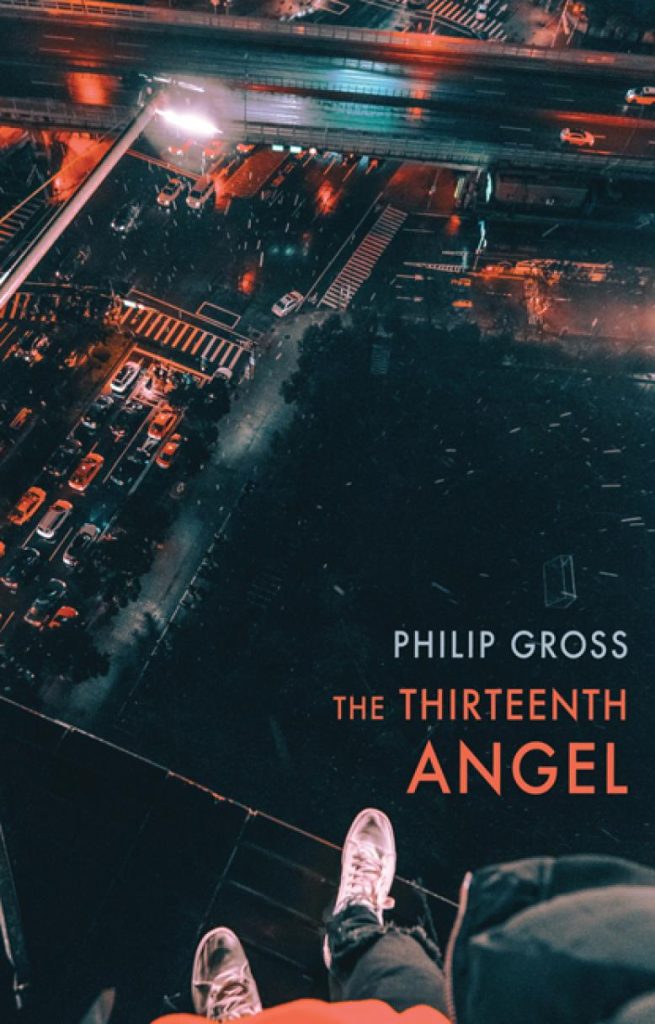The Thirteenth Angel (Shortlisted, TS Eliot Prize)
Philip Gross
(Bloodaxe Books, 2022); pbk. £12.00
On opening, Philip Gross’s book immediately engages with its fragmented poetry layout. ‘Nocturne: The Information’ gifts the reader stanzas which are chopped up, seemingly disjointed on the page. Structure supports content, the corrugated stanzas echoing the front cover’s Blade Runner-esque landscape of blinking lights:
Out of body — of the body of the city,
not soaring, just three storeys, more the low
swoop of an angel
or the shite-hawk kites
street sweeping London in an age of Plague.
and
Old stories come back from the dead — of soul
as guest, at worst as hostage in the body —
turned truer,
now we are the information?
Yet Gross’s collection is focussed not on just the urban itself, but on wider landscapes, or landscapes as sites and depictions of emotion. The ‘megaliths of his own boredom’ (‘Smatter’), ‘love, and years, the lost tracks in the sand, or ploughed field where the harrow turns over one’ (‘Porcelain’), place the speaker within moments of feeling, both minor emotions and grander revelations.
The presence of the human within landscapes is also addressed by Christian elements, fulfilling the promise of the collection’s title as much as the urban imagery of ‘Nocturne: The Information.’ ‘Smatter’ contains religious tones—thoughtful reflections in ‘Overwrite me, he once whispered to the world—some kind of adolescent rapture’, suggest a sort of monastic oral tradition, of words contemplated over years of retrospection.
In tandem with this reflective writing, a sense of loss generated within the text. ‘Scenes from the Lives of Stone Angels’ gathers imagery of decay and neglect, layered over images of old stones and monuments:
Stump angels
that one of the lost
count of burnings and sackings left as relic —
unintended cross
left by the punching out
of windows, blunt X buttressed
by two blunter figures in flight, all distinguishing
features erased[.]
Throughout the collection, a growing sense of guilt builds-up—indignation at humanity, and its approach to the world. ‘Disintegration Loops’ suggests a lack of creativity, with music ‘decaying – iterations like the same day seen, re-seen’ where there is nothing new, merely vacant recycling. ‘Moon, O’ expands this dialogue, as Gross tells the moon, ‘Don’t let us think, not for a moment, we can have you’.
Gross seems to tire of how humanity is – and invites us to return to our better selves. ‘Psalm, You’ directly speaks to the reader, asking us to return to the time when we were able to describe, and count things. Waves, heartbeats, reconnect with a natural rhythm, a state of being, to achieve a ‘seamlessness which You, if we can use the word at all, must surely see, or be.’
We return to reality with ‘Pandemia’. The poem’s opening, ‘1. Springwatch in Lockdown’ takes us back to COVID times, a note of isolation, tentativeness – Scenes of the world, still and silent, allow a breath to occur, a pause for reflection.
A moment on the threshold,
if we dare to see.
The final two poems return to the Christian image – ‘Descants on Dante’ describes Hell, Purgatory, and Paradise from the Divine Comedy. Yet, Gross returns to ‘Nocturne’, with the urban life re-emerging, and with it the desire to return to nature:
Here, the Countenance
Turned inwards, eyes closed, to feel the precise
Touch of thing – of skin, of moist soil[.]
The final poem, the titular ‘Thirteen Angels’ completes Gross’s message. Each Angel is a thing, an experience of reality that one may come across – breath, mistake, music, emptiness… The angels are the lines by which we can truly experience the natural world, beyond the urban trappings of modern life…
And the thirteenth angel is the world itself.
James McLeish


Leave a Reply